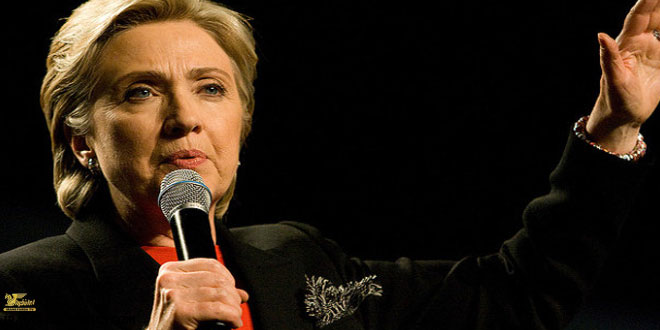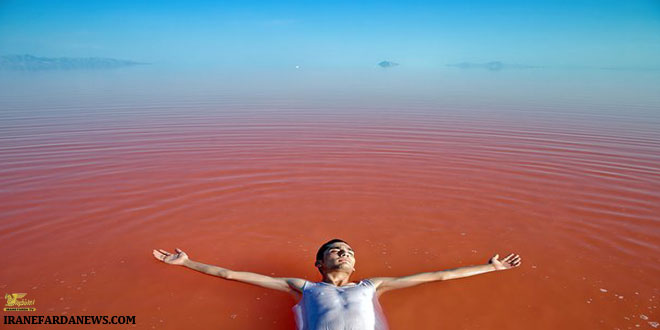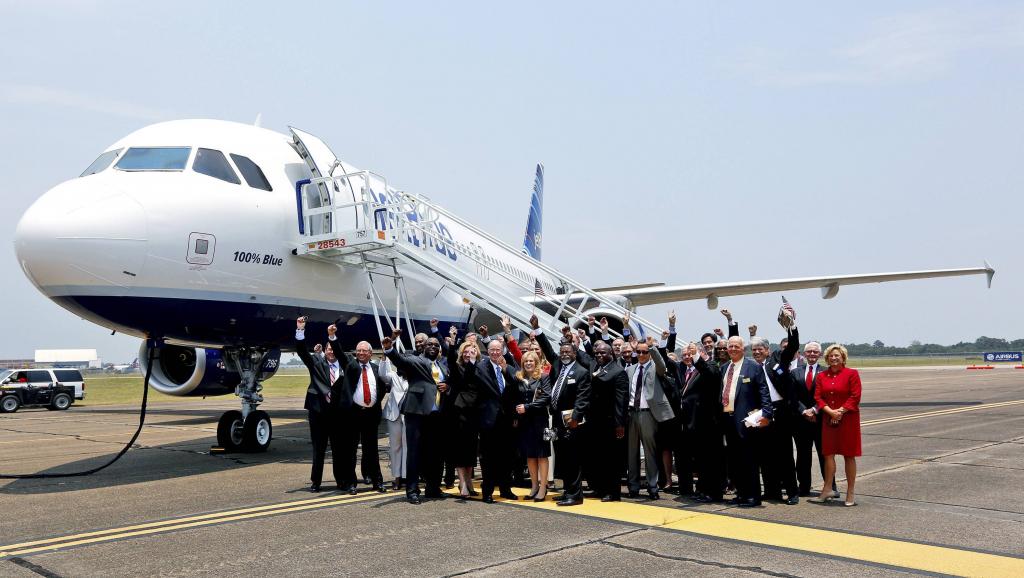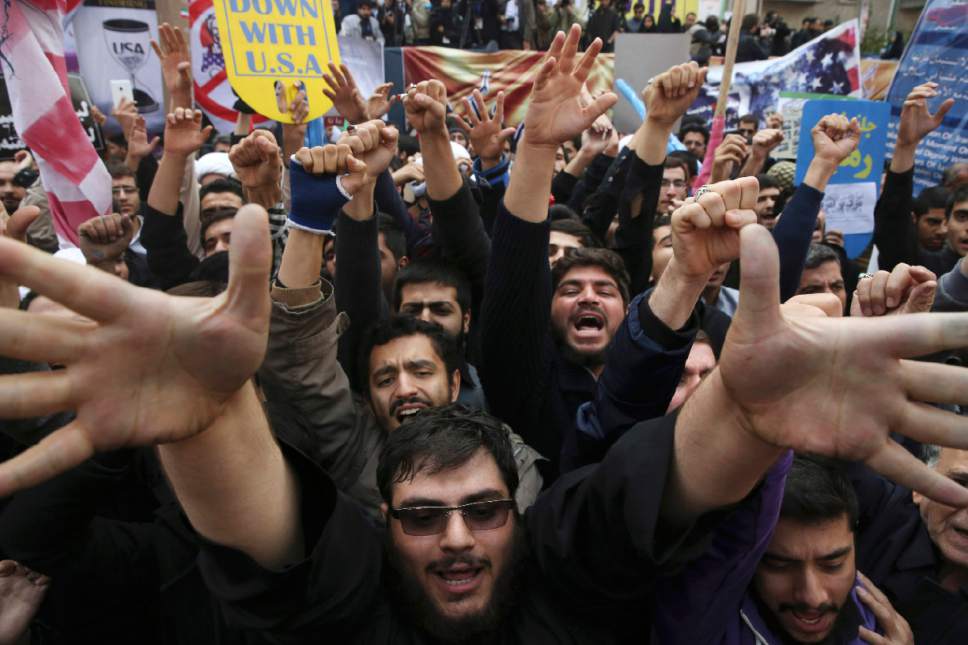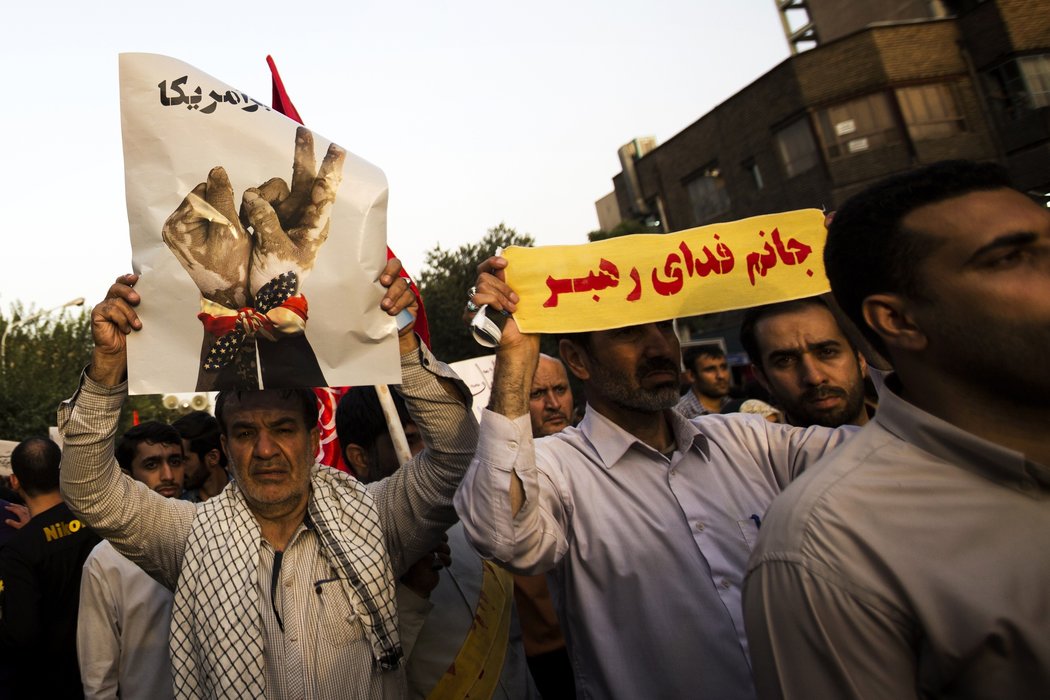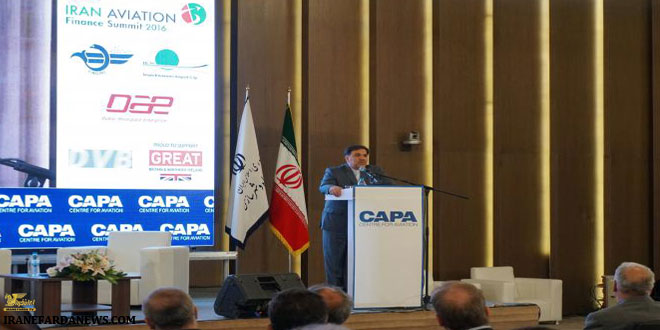TEHRAN, IRAN — Small Iranian fast-attack boats race toward American warships in the Persian Gulf, turning away at the last minute as warning shots are fired – just one of many recent incidents that are prompting hard-line Iranian media to crow that the US superpower has been “humiliated, again.”

In the latest episode last weekend, Iran warned two US Navy surveillance planes flying high at the edge of its territory that it would shoot them down if they entered Iranian airspace.
Iran and the US have been provoking each other militarily for more than 30 years, engaging in a volatile tug-of-war in the Persian Gulf, where one-third of the world’s seaborne oil supply travels through the Strait of Hormuz.
But threatening incidents have spiked recently, with at least 32 reported so far this year, compared with 23 in all of 2015. Gen. Joseph Votel, the head of US Central Command, said earlier this month that Iran’s moves are an attempt to “exert their influence and authority in the region.”
The US military says all recent incidents have occurred in international waters, and that such “harassment” from Iran is “unsafe and unprofessional.” Senior Iranian officers, meanwhile, downplay their actions as “routine” and defensive – but declare that a “severe” reaction will follow if they detect any aggressive US intent.
Analysts say the uptick sends two messages from Iran’s more ideologically driven Islamic Revolutionary Guard Corps (IRGC), which has been engaged in a struggle for influence with the centrist President Hassan Rouhani: First, that it will challenge its superpower enemy in its own backyard, even at the risk of escalation; and second, to remind Mr. Rouhani that, despite last year’s nuclear deal with the US and global powers, the IRGC plays a key military role, and often a provocative one.
Those calculations mean that, even as all sides downplay the dangers, the Persian Gulf remains a flashpoint.
“In the Persian Gulf, any mistake by one soldier – one soldier – could raise fire across the entire Persian Gulf or Sea of Oman. We worry about that,” says Abbas Qaidaari, a military expert at the Center for Strategic Studies, a think tank attached to Iran’s presidency. “We think that any unprofessional action, by Iranian fleets or the US and its allies, will be destructive.”
That means the stakes are high for correctly interpreting the other side’s moves. The Persian Gulf encounters are “just a signal, not a realistic action and it does not reflect our real policies. The US has to listen carefully,” suggests Mr. Qaidaari.
“In any country there are hardliners, in the US, too,” says Qaidaari, who argues that the IRGC won’t hurt the US in the Persian Gulf because of national security interests. “We have this community of hardliners who maybe want a war in the Persian Gulf. But look to the commander-in-chief [Supreme Leader Ayatollah Ali Khamenei]: He never wanted to start a new war in the Persian Gulf.”
Recent incidents
Among recent incidents, Iran test-fired rockets near US ships last December, and an Iranian drone passed over a US aircraft carrier in January. The US Fifth Fleet, based in Bahrain, frequently conducts naval exercises with Gulf allies.
Adm. Alireza Tangsiri, acting commander of the IRGC Navy, said patrolling the Persian Gulf is a “round-the-clock mission that will continue in the future” – with particular attention paid to US activity.
Iranian conservatives cite “threatening” American behavior so close to Iran’s borders, and they recall that 10 US sailors were found in Iranian waters in January; Iran briefly seized them at gunpoint. Swift direct contact between top diplomats of both nations – an informal channel created during the nuclear talks – led to a quick resolution.
But often events move too quickly in the cramped waters of the Persian Gulf to prevent an escalation, without a dedicated line of communication. IRGC war games have included targeting replica American warships with Iranian fast-attack boats and missiles.
“We definitely believe they trespassed our waters … in most [recent] cases,” says Mohsen Rezaei, a former IRGC commander and secretary of the Expediency Council, in an interview.
To Mr. Rezaei, the reason for Iran’s concern is obvious: “The security of the Persian Gulf is in fact the security of Iran.”
“There were a few cases in which our speedboats were suspicious about their activities, so they had to get closer,” says Rezaei. Iranian craft approached even when US ships were in international waters.
“Our speedboats mostly just send them a warning – they don’t actually take any action – to understand the reaction of the other side,” says Rezaei. Are those actions dangerous? “Not from our side.”
Hard-line media in Iran have emphasized “powerful warnings” sent to the US. Vatan-e Emrouz headlined in mid-July that short-range Iranian Tondar missiles had been “as close as 500 meters to the USS New Orleans” – an amphibious assault ship deployed in the Persian Gulf at the time.
With evident relish, the conservative Kayhan newspaper quoted a Washington Times headline from late August, saying that “confrontations reveal Obama’s nuclear deal having little effect on Iran’s behavior.”
Challenging Rouhani
Such a result is a domestic challenge for Mr. Rouhani, who has in the past questioned IRGC timing of ballistic missile tests as provocative. Analysts say current IRGC actions send a deliberate message to Rouhani, who is under fire from rivals in advance of May 2017 presidential elections.
“After Mr. Rouhani tried to limit missile tests, the IRGC itself wants to show it is still doing its duties, to say, ‘Even if the [Rouhani] government is trusting the US, we don’t trust them,’ ” says Mojtaba Mousavi, the founder of the conservative IransView.com website.
Mr. Khamenei and the establishment “feel the danger,” he says, pointing to the example of Iraq and Libya, which both took steps to accede to US and Western demands, only to be later attacked.
“When the leader says you can’t trust the US, we can’t limit the military, because the US is waiting for the opportunity to weaken us,” says Mr. Mousavi.
Analysts note that the incidents come amid a debate in Iran about reducing military spending, even as Iran is deeply engaged in costly wars in Syria and Iraq as well as Yemen. Mr. Khamenei has firmly backed a strong military, dismissing suggestions that high defense spending should give way to a future of diplomacy only.
Indeed, when Rouhani ally and former president Akbar Hashemi Rafsanjani tweeted last March that the future was a “world of discourse, not of missiles,” Khamenei responded that such talk might be “treason,” adding: “Today it is a time for both negotiations and missiles.”
The flashpoint
The Persian Gulf is one of the few places where the US-Iran standoff has periodically turned hot. Toward the end of the Iran-Iraq war in 1988, an Iranian mine heavily damaged a US ship, prompting the US to strike two Iranian oil facilities and sink several Iranian vessels. Few Iranians forget the accidental downing of an Iran Air civilian plane by the USS Vincennes in 1988, killing all 290 passengers, because it was mistaken for an attacking Iranian jet fighter.
The political standoff in Iran is reflected in “a strategic gap” between hardliners and Rouhani and his allies, says Qaidaari of CSS. Hardliners see the US presence through the prism of a threat, with US bases dotted across the region and “an attack policy for three decades, so [therefore] we can attack them, and we are able to, with our surface-to-sea missiles and fast-attack boats.”
The Rouhani side asks, “Why should there be this conflict in the Persian Gulf, with very serious potential for battle between Iran and the US and its allies?” adds Qaidaari. “There is only one way to change, to pay attention to common interests and not ideological policies.”
http://www.csmonitor.com/World/Middle-East/2016/0919/Persian-Gulf-incidents-spike-sending-message-from-Iran-hardliners
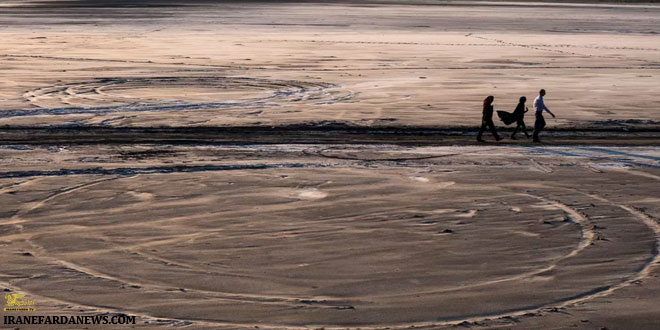
 khalijefars News, Blogs, Art and Community
khalijefars News, Blogs, Art and Community
 Hamid Reza Karimi, 24, left, and Ismail Karimi, 36, are unable to plant this plot of land because of the water shortage in Iran.
Hamid Reza Karimi, 24, left, and Ismail Karimi, 36, are unable to plant this plot of land because of the water shortage in Iran.
